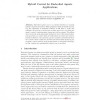Free Online Productivity Tools
i2Speak
i2Symbol
i2OCR
iTex2Img
iWeb2Print
iWeb2Shot
i2Type
iPdf2Split
iPdf2Merge
i2Bopomofo
i2Arabic
i2Style
i2Image
i2PDF
iLatex2Rtf
Sci2ools
KI
2009
Springer
2009
Springer
Hybrid Control for Embodied Agents Applications
Embodied agents can be a powerful interface for natural human-computer interaction. While graphical realism is steadily increasing, the complexity of believable behavior is still hard to create and maintain. We propose a hybrid and modular approach to modeling the agent’s control, combining state charts and rule processing. This allows us to choose the most appropriate method for each of the various behavioral processes, e.g. state charts for deliberative processes and rules for reactive behaviors. Our long-term goal is to architect a framework where the overall control is split into modules and submodules employing appropriate control methods, such as state-based or rule-based technology, so that complex yet maintainable behavior can be modeled.
Appropriate Control Methods | Artificial Intelligence | KI 2009 | Natural Human-computer Interaction | State Charts |
| Added | 27 May 2010 |
| Updated | 27 May 2010 |
| Type | Conference |
| Year | 2009 |
| Where | KI |
| Authors | Jan Miksatko, Michael Kipp |
Comments (0)

